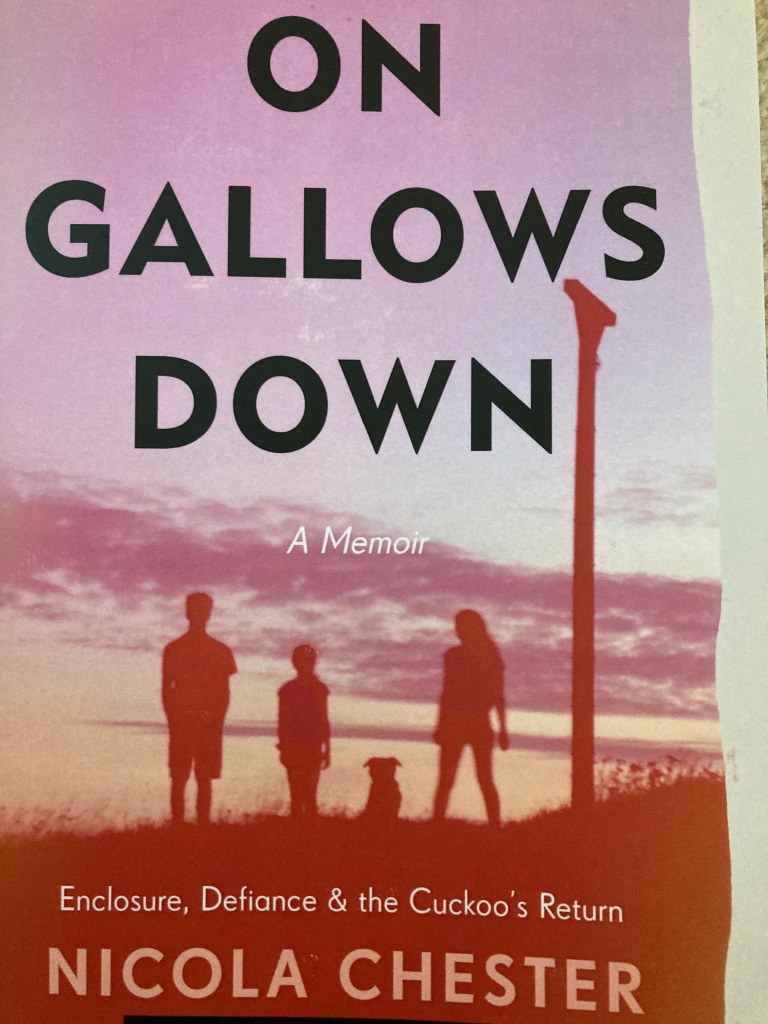
As I have mentioned recently, I’ve had a long standing health problem which has stopped me from doing much work, and even less writing. Reading became difficult to the point where I had to stop after about half an hour. I’m still having some of the symptoms, but I am glad to say that things have gradually been improving (thanks Amitryptyline) and I felt well enough to read a book from cover to cover. It has taken me a while but I was glad to have done it.
The book is On Gallows Down by Nicola Chester, published last October by Chelsea Green publishing. The subtitle has changed since the proof copy, to “Place, protest and belonging”. It’s a deeply personal book, a nature memoir, recounting Nicola’s own history and relationship with the nature around her.
Nicola’s patch is relatively small; West Berkshire, including Newbury and Greenham Common, then Inkpen and the eponymous Gallows Down. She recounts a deeply rural life, of tied cottages on large estates, horse-riding and nature-watching. But of course the places her personal story travels through are resonant with other larger events. Greenham Common – where the cruise missiles were based during the latter years of the cold war – and the famous (or infamous depending on your viewpoint) Greenham Womens’ Peace Camps. The nearby town of Newbury – a pretty market town, but also the place of famous battles – two in the English Civil War, and more recently the conflict over the Newbury Bypass. Nicola recounts some amusing, and uncomfortable, experiences as a teenager curious and not a little frightened by the armed troops defending the base and its missiles – and later took part in that campaign to resist the bulldozers and tree-choppers in the late 90s.
Her story continues to marriage and children, as well as her growing love of nature and her evident talent for writing about nature. She starts writing a regular column for RSPB magazine, and then writes a also writes a book for them – though of course this isn’t enough to live on and she becomes a school librarian. The latter part of the book explores her brave attempts to work with the estate gamekeeper, to improve the lot of the very rich and diverse wildlife the estate supports, but finally her desperation when she realises she has been misled, perhaps betrayed.
The book is suffused with her profound love of nature and place. There is plenty of really interesting local history too and she often returns to the work of the peasant poet John Clare, as a touchstone. I think Nicola identifies very much with Clare’s experience, watching the nature and the places he loved being destroyed by Enclosure, while Nicola has watched a similar thing happen in her life-time, the expulsion of nature – and people – from the modern industrial countryside.
I found myself reflecting on similar experiences in my own life, and there was a particular moment when I realised it was quite possible that I had been standing next to Nicola, 25 years ago, when she was flattened by a galloping Police horse during the Newbury Bypass protests. I still haven’t found the photo I took, but I will try and find it.
Nicola has written a remarkable book, very personal but also addressing all the larger themes of rural life in late 20th and early 21st century England. Land ownership: as Guy Shrubsole has noted, half of West Berkshire is owned by just 30 families. The largely hidden but massively influential role of the field sports industry, on both our human experience of the countryside; and the wildlife that survives there. Poverty and the very poor quality of housing in rural England. The relationship between farm tenants and the estates on which they live. Bringing up children in rural England and the challenges of getting them to school many miles away, but also the fantastic opportunities they have to grow up within a landscape where nature can still flourish (in places). It may come as a surprise to some that West Berkshire can still be so deeply rural.
If I had one suggestion it would be that the text would benefit from some photos or drawings of the places Nicola writes about, in addition to her hand-drawn map.

Glad to read that you’re mending Miles, albeit slowly: Amitryptyline be praised indeed! I remember being struck how many large landowners remained in Oxfordshire compared with Co Antrim when I moved from latter to former for employment. I guess Mr Gladstone and successors had reformed land tenure significantly across Ireland in the late 19th and early 20th centuries but not in Great Britain. That said, that process apparently continues in NI to some extent: this may be of interest: http://www.nilawcommission.gov.uk/land-law-reform.htm
thanks very much Dave
Happy New Year and I’m glad to hear you’re feeling better. Excellent book review too; i hope you manage to do more of them.
thanks very much Jon – happy new year to you too.